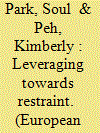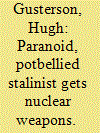| Srl | Item |
| 1 |
ID:
107926


|
|
|
| 2 |
ID:
171789


|
|
|
|
|
| Summary/Abstract |
The emergence of new nuclear aspirants has posed a great threat to the post-Cold War global non-proliferation regime. These states have adopted a nuclear hedging strategy that has been deemed both strategically risky and politically difficult to maintain. Yet, hedging has not automatically resulted in nuclearisation. We analyse the conditions under which a nuclear hedger shifts its nuclear policy towards one of restraint. Drawing insights from prospect theory, we argue that a nuclear policy shift occurs when a nuclear hedger gains an asymmetric leverage vis-à-vis its adversary. Specifically, a hedging strategy that is based on loss aversion will only be abandoned when a shift in the nuclear aspirant's reference point occurs during negotiations. To test our theoretical arguments, we conduct an in-depth case study of North Korea's nuclear policies throughout the 1990s and 2000s. The empirical study of the changes in North Korea's negotiating stance during the Agreed Framework negotiations and the Six-Party Talks supports our asymmetric leverage thesis. We conclude with broad policy implications for the non-proliferation regime.
|
|
|
|
|
|
|
|
|
|
|
|
|
|
|
|
| 3 |
ID:
080629


|
|
|
|
|
| Publication |
2008.
|
| Summary/Abstract |
Mainstream American print media coverage of North Korea's nuclear weapons program has been deeply flawed, a reality that skews policy debates and confuses public perceptions. Even simple factual descriptions of the parties' obligations under the 1994 Agreed Framework have often been inconsistent and partial, informing readers about North Korea's obligations more than U.S. obligations, and rarely acknowledging U.S. failures. The media repeated allegations about an illicit North Korean uranium enrichment program based largely on anonymous sources, who made what seem now to have been misleading statements. Journalists rely for comment on administration officials or members of Washington think tanks, while making little effort to gather opinions from academics, those on the left (as opposed to centrist liberals), or experts in Southeast Asia. Journalists also frequently present Kim Jong Il in ways that erase the Korean perspective on U.S.-Korean relations. Accurate, nuanced coverage of events on the Korean Peninsula is vital in producing an informed public and a policy-making process that is judicious, supple, and intelligent. This article concludes with various ways in which the media could better report on North Korea
|
|
|
|
|
|
|
|
|
|
|
|
|
|
|
|